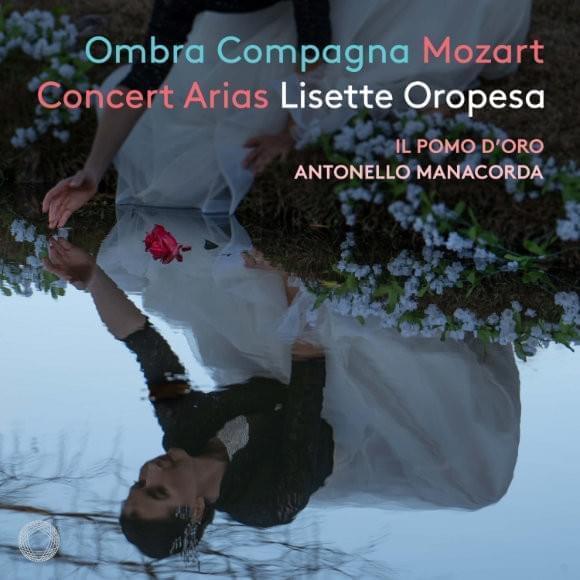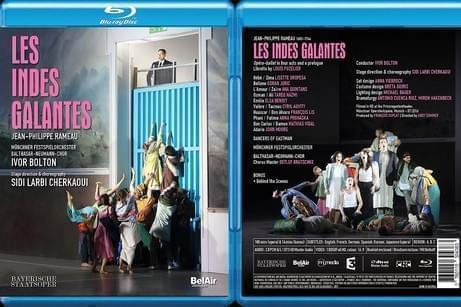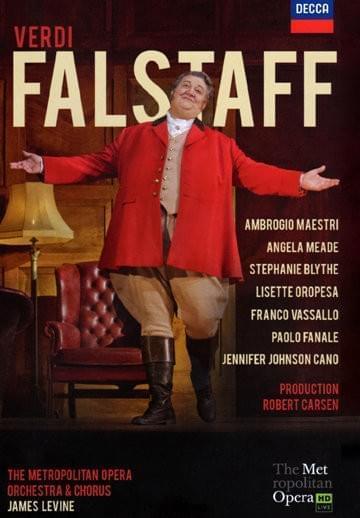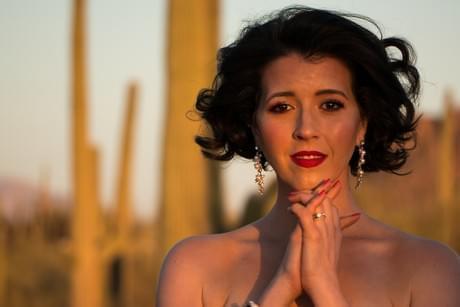Lisette's first-ever album with an orchestra, Ombra Compagna, continues to garner wide accolades and critical reception by some of the most important critics in the industry. This exciting new release by San Francisco Classical Recording Company and Pentatone packs 80 minutes of some of Mozart's most difficult and expressive works. In the hands of Antonello Manacorda and the Il Pomo d'Oro orchestra, arises a finely crafted compendium with a complete 5.1 surround sound disc on a Super Audio CD.
Don't just take out word for it, read what the critics are saying.
Oper! Magazin CD of the Month
Sunday Times Recording of the Week
German Record Critics Nominated Best Vocal Album of the Year
Gramophone UK Essential Classical Album of the Week
Opéra Magazine ★★★★★
On Lisette Oropesa’s new album, “Ombra Compagna,” the thirty-seven-year-old soprano demonstrates that she has the natural elasticity, warm timbre, and altitudinous notes to match this repertoire. Take the high E in “Vorrei spiegarvi, oh Dio!”: Oropesa floats up to it with the weightlessness of a dandelion seed climbing a breeze, her voice spinning freely the entire time ~The New Yorker
Lisette Oropesa & phenomenal singer and very personal interpreter. The very nature of Aria da concerto makes it a product intended for exceptional voices; To say now that I seem to find its best characteristics in Lisette Oropesa's singing and accent - that as an exclusive material for this - is the best I can say. Two artists on a desert island record: please make another one. ~Classical Voice Italy (Elvio Giudici)
Indeed, there is an instrumental quality to her beguiling soprano that makes light of the demands of these mini-masterpieces. The finest solos here were made for three singers Mozart admired: his first love and eventual sister-in-law, Aloysia Weber; Luisa Villeneuve, his first Dorabella in Cosi fan tutte; and the Prague soprano Josepha Duschek. Oropesa’s tangy soprano soars in Vorrei spiegarvi (for Weber), challenging the oboe obbligatist with her pearly notes, and she suggests a sultry sensuality in Vado ma dove? and estimable trills in Bella mia fiamma (Duschek). Oropesa’s dazzling debut recital whets the appetite for more. ~The Times UK
And the new album by the soprano Lisette Oropesa dedicated to the concert arias of the great Salzburg composer, edited by Pentatone with a sound of exceptional quality, is one of those jewels that should be treasured in a nightclub, a CURRENT OPERA Selection ~Opera Actual
Light-lyrical soprano with a clear and bright timbre and distinctive but well-controlled vibrato, Oropesa possesses many of the qualities necessary to deal with Mozart. She sings with taste, color and marked musicality, it is fluid in the phonation - without particular efforts - and overall homogeneous in the registers. ~Conessi all'opera
The variety of themes proposed, especially in the concert arias, allows Oropesa to unfold a song capable of combining technique and expressiveness for which it is necessary to go back to Lisa della Casa or Elly Ameling to find a comparison. ~Le Salon Musical
Oropesa infuses the sung word with a human, profound participation. This does not mean that it transcends and deviates style and common sense: far from it. The allegory is not humanized beyond measure, the pathos does not light up in too theatrical ways, but are expressed with frankness and freshness, animating the aristocracy of expression also through the peculiarity of the timbre and the ability to juggle colors. ~L'ape Musicale
Oropesa awakens stage characters, suffers and rejoices, tracks down spiritual raptures and hurls coloratura over the ramp. Her actually lyrical soprano with enormous flexibility and richness of color allows her this gripping approach to the arias recorded here. In some cases her rich, warm tone, the authentic and emotional presentation is almost old-fashioned. When listening to this CD, one often has to think of the great Mozart singers of the past such as Sena Jurinac, Lucia Popp or Irmgard Seefried, sometimes also of the pearly charm of a Rita Streich. But the voice is one hundred percent Oropesa. ~Klassik Magazin
Lisette Oropesa's voice has a velvety luxurious timbre, reminiscent of the star soprano Angela Gheorghiu with elegantly darkened vowels. Building on a sonorous, full depth, this voice reaches a cooing, briefly vibrating middle register with great luminosity even at stratospheric heights. Coloratura and runs are clean and accurate. The characteristic of the voice with lyrical is probably no longer sufficient, more dramatic approaches have long been mixed into the still easy-going voice guidance ~Online Merker
Oropesa sings with exquisite emotional restraint, subtly shading her vibrato and colouring her mezzo range with a Schwarzkopf-like radiance and intensity. ~Classical-Music.com
Lisette Oropesa’s imaginatively planned debut recital were designed to display Aloysia’s agility and what a contemporary dubbed her ‘extraordinary upper range’. Oropesa’s coloratura flights have all the scintillating precision one could wish for in the vocal concerto Ah se in ciel, benigne stelle. Here and in the other two solos for Aloysia, Non so d’onde viene, with its sensuous woodwind colouring, and Vorrei spiegarvi, Oropesa spins a refined legato line and effortlessly negotiates Mozart’s vertiginous leaps and plunges. She musters a true trill, a must-have for any self-respecting 18th-century singer; and singing with a care for the sound and meaning of the Italian texts, she responds keenly to character and dramatic situation, whether in the muted sorrow of Non so d’onde viene or the mingled agitation and tenderness of Vorrei spiegarvi, with its exquisite duetting between voice and oboe. ~Gramophone
Avec raison, la soprano américaine établit un parallèle entre l’écriture des parties solistes de ceux-ci et celle des Airs de concert : même exigence de contrôle du souffle, de la dynamique, avec, en plus, le souci d’une juste expression des sentiments, et ce en quelques minutes seulement. Elles sont effectivement redoutables, ces pages destinées à de grandes cantatrices (Aloysia Weber, Louise Villeneuve, Josepha Duschek...), qu’on a souvent comparées à des opéras en miniature – certaines, comme « Ah, lo previdi », sont construites sur des contrastes d’une redoutable efficacité. ~Opéra Magazine



,format(webp)/https%3A%2F%2Flisetteoropesa.com%2Fmedia%2Fnews%2Fspain-recital-tour-2021.jpg)
,s,m,a,r,t,,,f,o,r,m,a,t,(,w,e,b,p,),,,s,h,a,r,p,e,n,(,0,.,5,,,0,.,5,,,t,r,u,e,)/https%3A%2F%2Flisetteoropesa.com%2Fmedia%2Fgallery%2F2024%2Fportraits%2F202408-07-portrait-lisette-oropesa.jpg)







